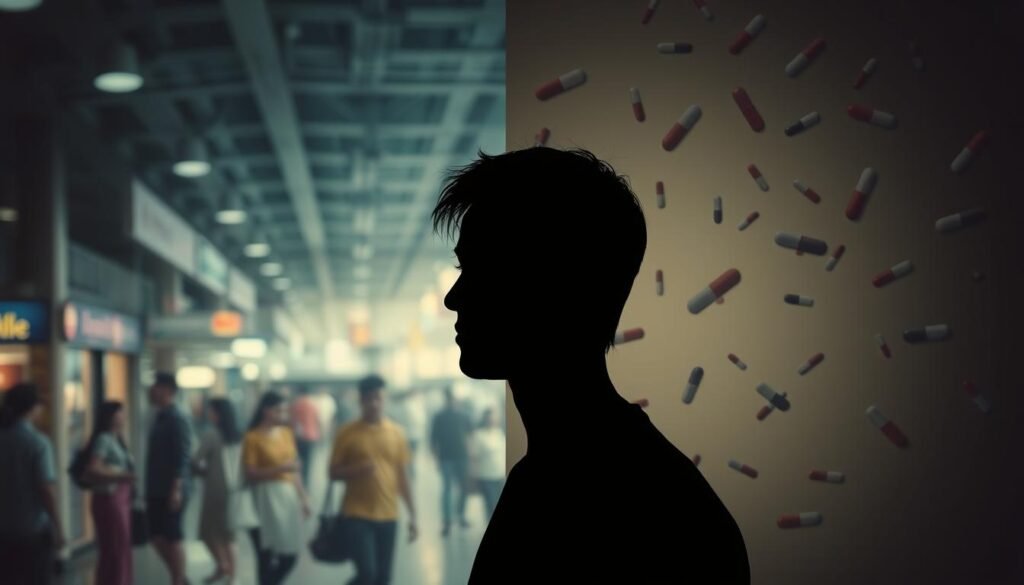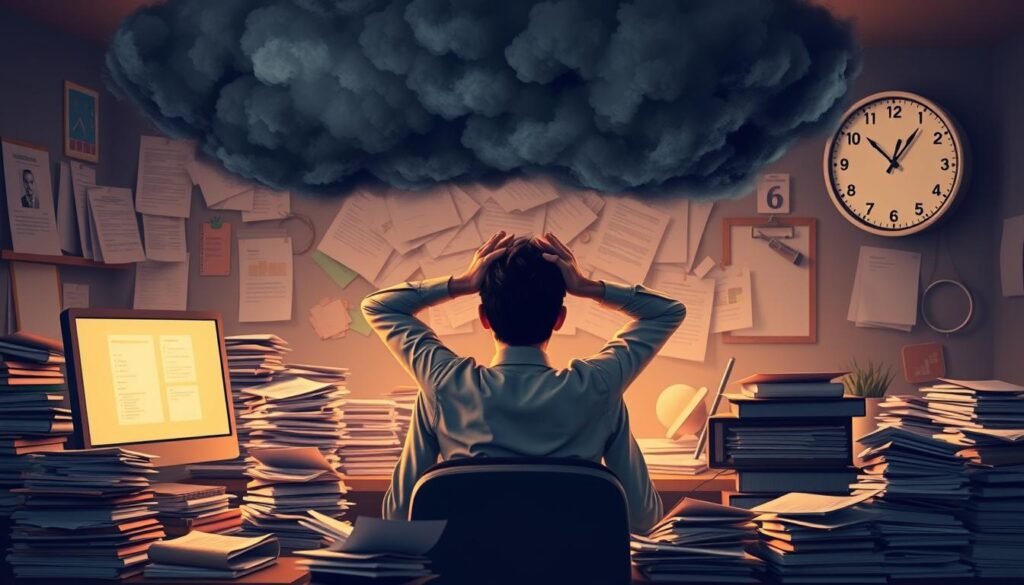Have you ever thought about why certain people get really sad after specific events, while others don’t? This is known as reactive depression. It questions what we usually think about mental health. It’s also called situational depression because it starts after stressful events. That’s why studying it is key to finding the best ways to deal with it.
To help our mental health, we must understand reactive depression’s roots. It usually shows up within three months after tough times like losing someone, having problems in relationships, or facing money issues. Normally, the sadness gets better about six months after the issue goes away. But if it doesn’t, the problem can become much worse. This shows why it’s so important to notice and help with this kind of depression early on.
This article will talk about what can cause reactive depression, including big life changes and long-term illness. Knowing about these triggers can help people understand what they’re going through. It can also guide them to get the help they need.
Key Takeaways
- Reactive depression develops as a response to identifiable external stressors.
- Symptoms typically emerge within 90 days of a triggering event.
- This form of depression often resolves within six months following the removal of the stressor.
- It can develop into major depressive disorder if symptoms persist beyond six months.
- Factors such as previous life experiences can increase vulnerability to reactive depression.
- Effective coping strategies include physical activity, therapy, and social support.
What is Reactive Depression?
Reactive depression is also known as situational depression. It happens due to certain life events or stress. It comes from facing tough situations like losing someone, job problems, or traumatic incidents. Knowing what reactive depression means is key for getting through hard times.
Signs of this condition usually show up within three months after the event. You might feel very sad, get easily upset, and act differently than usual. Reactive depression is different from other types because it’s caused by things happening around you. It is one type of depression that’s linked to specific events.
People with reactive depression can see their symptoms improve within six months if they get help early. Spotting these signs early and getting help is vital. Doing things like staying active and finding support from others helps build strength in these times.
| Aspect | Reactive Depression | Endogenous Depression |
|---|---|---|
| Cause | External stressors | Genetic/Biological factors |
| Onset | Within three months of stressor | Can arise without obvious triggers |
| Duration | Up to six months | Can last longer and recur |
| Treatment | Medication & Psychotherapy | Medication & Therapy tailored to individual needs |
If you understand and get the right support, you can deal with reactive depression. Therapy and medicine really help during these tough times. They support your emotional well-being too.
The Connection Between Life Stressors and Reactive Depression
Life stressors deeply affect our mental health. They can trigger reactive depression, especially during significant life changes. It’s important to know this link so we can recognize the risk of reactive depression.
How Major Life Changes Trigger Reactive Depression
Major life changes can lead to reactive depression. This can happen with both good and bad events. Starting a new job might be exciting but stressful, while losing a job can feel overwhelming. This emotional rollercoaster can make reactive depression symptoms worse. People who are more genetically prone to depression may be more affected by these stressors, showing how genes and environment both play roles.
Examples of Life Stressors
Many life stressors can bring on reactive depression, such as:
- Relationship issues, like breakups or marital problems
- Being diagnosed with a chronic illness
- Money troubles causing legal or financial stress
- Going through traumatic events, including accidents or assaults
- Experiencing significant losses, such as the death of a loved one
It’s key to spot these stressors as possible triggers for reactive depression. Facing several stressors can increase someone’s risk. This makes learning to cope even more critical. For more details on reactive depression, check out this resource.
Causes of Reactive Depression
Reactive depression comes from various factors that deeply affect someone’s feelings. Grief and loss are major triggers. They can make someone feel very sad and hopeless. It’s key to recognize these feelings to help with the challenges they bring.
Understanding the Role of Grief and Loss
Loss of a loved one or big life changes can really hurt our mental health. This kind of pain can make us feel as low as someone with major depression. People may feel very alone, sleep poorly, and lose their appetite during this tough time.
Reactive depression often happens as people try to get through their big loss. This shows how important it is to understand grief when we talk about reactive depression.
Impact of Traumatic Events
Events like natural disasters, accidents, or being hurt by someone can also cause reactive depression. These things can make someone feel very scared and sad. They can have long-lasting effects on how we deal with daily life. Support from others is crucial for those affected.
It’s important to look at how trauma and mental health connect. This helps create good ways to cope. Understanding this helps us see how these events change our feelings.
The Effects of Chronic Illness on Mental Health
Chronic illnesses can deeply affect not just the body but also the mind. They often lead to emotional struggle. This is because dealing with a long-term illness can make you feel distressed. This increase in distress can sometimes lead to depression. Many studies have found that chronic illness and mental health are closely linked. They show that medical issues can make emotional problems worse.
Medical Conditions Linked to Reactive Depression
Some illnesses like diabetes, high blood pressure, and heart problems often lead to more depression. Coping with these illnesses can be really hard on your mental health. Here’s a table showing how some illnesses relate to depression:
| Medical Condition | Depression Risk (%) | Life Expectancy Impact |
|---|---|---|
| Diabetes | 18-28% | Reduced lifespan by 5-10 years |
| Hypertension | 16.7% | Similar reductions in life expectancy |
| Cardiovascular disease | Increased likelihood, varies by comorbidities | Overall lifespan significantly shortened |
| Arthritis | Approximately 10% | May contribute to mobility limitations, affecting quality of life |
| Cancer | Higher incidence when paired with other chronic conditions | Often leads to psychosocial stress impacting overall health |
Coping Strategies for Chronic Illness
There are many ways to help improve your mental health if you’re dealing with chronic illness. Here are some helpful strategies:
- Support Groups: Connecting with others in similar situations can make you feel less alone.
- Physical Activity: Regular exercise can boost both your mood and health.
- Mindfulness Practices: Meditation and yoga can help ease depression symptoms.
- Cognitive Behavioral Therapy: This therapy helps you develop better strategies for coping and happier emotions.

Relationship Problems and Their Impact on Emotional Well-being
Relationship issues can deeply impact your mental health. They can cause reactive depression. Facing conflicts, breakups, or infidelity makes this impact of relationships on mental state more troubling. You may feel alone and less valuable, which can make depression worse.
Studies show couples with depression are much more likely to split up. This highlights how closely connected relationship problems are to emotional health. People with depression face more relationship challenges. These issues can even increase the risk of depression by a lot. Relationship conflicts often signal the start of depression, along with feeling rejected.
When you’re depressed, you might not want intimacy, which strains relationships even more. Being easily upset and having little patience can make fights happen more often. So, it’s very important to understand how relationships work. Having a supportive partner can really help fight the despair from depression.
Talking to a therapist or counselor can be a big help. Couples therapy, especially, can make you both happier and lessen depression. How we connect in relationships affects how we deal with depression. It’s important to look at our emotional bonds. For those dealing with relationship problems and mental health concerns, focusing on emotional wellbeing is key to feeling better overall.
Work-related Stress: A Common Trigger
Work stress is a big problem for many people. It affects your mental health and happiness. Challenges like tough tasks, disagreements at work, and the fear of losing your job can make you feel really stressed. The National Sleep Foundation says adults need 7 to 9 hours of sleep to help handle stress and avoid depression. Knowing about these pressures at work can help improve your life at work and home.
Understanding Workplace Pressures
There are many kinds of pressures at work. This includes having too much work and not getting along with others. About 40% of workers in the U.S. feel a lot of stress from their jobs. Also, 25% say their job is the main reason they’re stressed. This stress can make people less productive and upset, which is bad for everyone at work.
Identifying Signs of Work-related Stress
It’s important to notice if you or someone else is stressed from work. Signs of this stress include:
- Fatigue
- Irritability
- Decreased job satisfaction
- Increased anxiety or tension
- Difficulty concentrating
Finding these signs early means you can start fixing the problem. You might try therapy (CBT) or get help from a mental health expert. It’s good to talk openly about mental health worries at work. If we don’t deal with work stress, it can lead to serious problems like reactive depression. For more info on how work affects mental health, check out this paper.

| Stress Symptoms | Impact on Work | Potential Solutions |
|---|---|---|
| Fatigue | Reduced productivity | Regular breaks and rest |
| Irritability | Poor interpersonal relationships | Conflict resolution training |
| Decreased job satisfaction | Increased turnover | Employee engagement initiatives |
| Anxiety | Impaired decision-making | Access to mental health resources |
| Difficulties concentrating | Errors and accidents | Mindfulness and focus techniques |
Financial Difficulties and Their Effect on Mood
Money troubles can significantly affect your mental well-being. Losing a job or facing high debt can cause a lot of stress. This stress can make you feel very anxious and upset.
In 2022, inflation hit a peak not seen in 40 years. It pushed the Consumer Price Index up by 7.1% in November year-over-year. According to a Pew survey, 70% of Americans saw inflation as a huge problem. This led to more people feeling stressed and depressed. Food and energy prices soared, making it tougher for many.
Studies show that dealing with many inflation problems can make people more stressed. Over 119,000 people were studied, and those facing more inflation issues felt worse. Men, especially, found financial stress affected their mental health a lot.
Knowing how money troubles and mental health are connected is key. If you’re struggling, getting help matters. Therapy, financial advice, or community support can ease the stress. They help build mental strength and keep you steady, even when times are tough.
The Role of Substance Abuse in Reactive Depression
Substance abuse greatly influences reactive depression. Many use alcohol or drugs to deal with worsening depression. This dependency harms mental health and heightens despair, making recovery harder. Studies show a link between alcohol disorders and major depressive disorder. This proves the close relationship between these conditions.
How Substance Use Can Worsen Symptoms
Alcohol depresses the central nervous system, worsening depression symptoms. Those with substance abuse history face many problems. These include more suicide attempts and higher relapse rates. About 24.3% of men and 48.5% of women with alcohol dependence are depressed. This shows spiraling effects of substance use on depression.
Seeking Help for Substance Abuse
It’s important to treat both substance abuse and depression together. Getting help for addiction is critical. Treatments focusing on both issues at once are more successful. Cognitive Behavior Therapy (CBT) and Interpersonal Therapy (IPT) help ease depression and promote better coping skills. Adding mindfulness and physical activity to treatment improves emotional well-being. This aids in overcoming substance abuse and depression.
Identifying Symptoms of Reactive Depression
It’s important to recognize the symptoms of reactive depression to get help. This depression type comes from big life changes or stress. It leads to emotional changes and depression signs you can see.
Common Emotional Changes
Reactive depression causes many emotional changes. People often feel:
- Persistent sadness: This is when someone feels very sad all the time.
- Irritability: Small things make them more angry or frustrated.
- Feelings of hopelessness: They believe things won’t get better.
- Tearfulness: They cry a lot, often for no clear reason.
- Suicidal thoughts: They think about harming themselves or escaping their pain.
Behavioral Signs to Watch For
Depression’s behavioral signs affect everyday life. Look out for:
- Withdrawal from social situations: Staying away from friends, family, and fun activities.
- Disrupted sleep: Sleeping too much or too little as a way to cope.
- Changes in appetite: Eating a lot more or a lot less than before.
- Neglecting hobbies: Not enjoying activities that used to make them happy.
- Difficulties in managing daily tasks: Having trouble with work, home, or self-care.
How to Seek a Diagnosis for Reactive Depression
To start getting help for reactive depression, the first step is to talk to a doctor. This begins with a mental health assessment to look at symptoms and rule out other issues. It’s key to write down what you’re feeling, including what causes stress or sadness.
Doctors will ask about things in life that were hard before symptoms started. This could be a loss or ongoing work stress. Understanding these things helps you explain your feelings to doctors. This leads to an accurate diagnosis of reactive depression.
Finding professional support is important not just for naming the issue but for figuring out how to fix it. Treatments can range from therapy to unique methods like Satori Chair Therapy, based on what works best for you. Plans are made to fit how severe the depression is and what’s helped before.
To show how you get diagnosed, here’s a list of steps for finding out if you have reactive depression:
| Step | Description |
|---|---|
| Initial Consultation | Meeting with a healthcare professional to discuss symptoms and concerns. |
| Comprehensive Assessment | A detailed evaluation of emotional state, lifestyle factors, and stressors. |
| Diagnosis | Based on findings, a diagnosis will be made, including distinguishing between reactive depression and other conditions. |
| Treatment Planning | Creating a tailored treatment plan that may include therapy and medication as necessary. |
Knowing that reactive depression can get better in less than six months gives hope. Working with experts and doing a full mental health check-up increase healing chances. For more info on diagnosis and treatments, check out these resources on reactive depression.

Effective Coping Strategies for Reactive Depression
Reactive depression is tough, but there are good ways to deal with it. Combining changes in lifestyle and having support from others can really make a difference. These methods help individuals face the challenges of reactive depression more easily.
Lifestyle Changes to Improve Mental Health
Changing your lifestyle is key to fighting reactive depression. Adding exercise to your day can improve your mood and health. Getting enough sleep is also crucial, as it refreshes your mind and body.
Eating well helps your mental and emotional health. Activities like yoga, reading, or hobbies keep your mind off negative thoughts. They help you maintain a positive mindset.
The Importance of Social Support
Having support from others is just as important. Being close to family and friends gives you a safe space to express your feelings. Support groups create a sense of community, as everyone understands what you’re going through.
Talking about your sadness can make you feel less alone. It’s important to know that sharing how you feel can reduce the weight of those emotions. If coping on your own gets too hard, seeking professional help is a smart choice. It ensures you’re dealing with reactive depression in the best way possible.
Conclusion
When we dive into reactive depression, we see understanding its causes is key. Life stressors, chronic illness, and money troubles play big roles. These factors do more than just start the problem; they make recovery harder.
Tackling reactive depression means getting support and making changes in your life. Research shows that 56-60% of people get better with antidepressants. This shows why getting help early and finding the right treatment is crucial. Being aware and ready to act can create a supportive environment. This helps those struggling to feel more stable emotionally.
Staying updated on depression means looking at its biological, psychological, and social sides. Resources, like these studies, offer guidance on managing it. Understanding what increases the risk and knowing how to cope can lead to recovery. This helps improve mental health significantly.